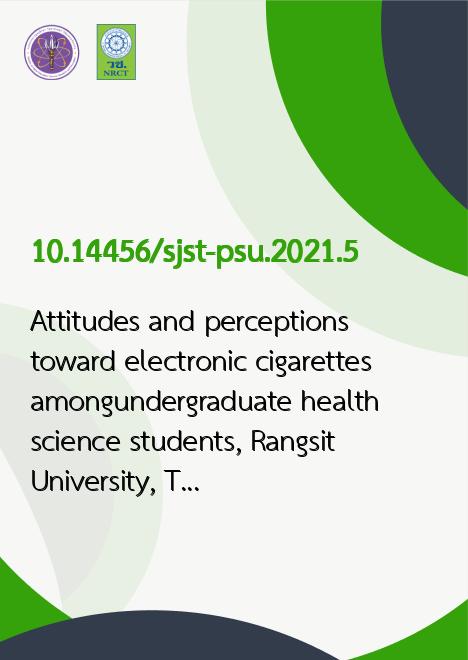
|
Attitudes and perceptions toward electronic cigarettes amongundergraduate health science students, Rangsit University, Thailand |
|---|---|
| รหัสดีโอไอ | |
| Creator | 1. Patchaya Kochsiripong 2. Prompiriya Pitirattanaworranat |
| Title | Attitudes and perceptions toward electronic cigarettes amongundergraduate health science students, Rangsit University, Thailand |
| Publisher | Research and Development Office, Prince of Songkla University |
| Publication Year | 2564 |
| Journal Title | Songklanakarin Journal of Science and Technology (SJST) |
| Journal Vol. | 43 |
| Journal No. | 1 |
| Page no. | 31-36 |
| Keyword | e-cigarettes, attitude, perception, health science students, misperception |
| URL Website | https://rdo.psu.ac.th/sjstweb/index.php |
| ISSN | 0125-3395 |
| Abstract | Objective: This study aimed to explore the attitudes and perceptions toward electronic cigarette (e-cigarette) use amongundergraduate health science students.Methods: A survey was performed in January to May 2019. The data collection was conducted through selfadministered questionnaires, which probed demographic data, attitudes, and perceptions toward e-cigarette use. Descriptivestatistics were used to present the demographic data and misperception prevalence. The data on e-cigarette users and non-userswere compared using Chi-square test or Fisher's exact test. Multivariable logistic regression was performed to determinepredictive factors of e-cigarette use.Results: The in total of 415 students by quota sampling were mostly female. Approximately 20% of the students weree-cigarette users whereas 10% were tobacco users. The major source of knowledge about e-cigarettes was friends or closefriends, while only 14% was from curriculum. The predictive factors of e-cigarette use were tobacco use, being around smokers,and alcohol consumption. E-cigarette users were found to have more misperceptions than those not using e-cigarettes in severaldimensions: health impacts, addiction, appearance, smoking cessation, and legal exception.Conclusions: Undergraduate health science students had misperceptions about e-cigarettes in several aspects. Theinformation about e-cigarettes in the curriculum was insufficient and posters or boards in the university were not effective.Consequently, supplementary knowledge should be provided and attractive smoking cessation campaigns should be created. |
